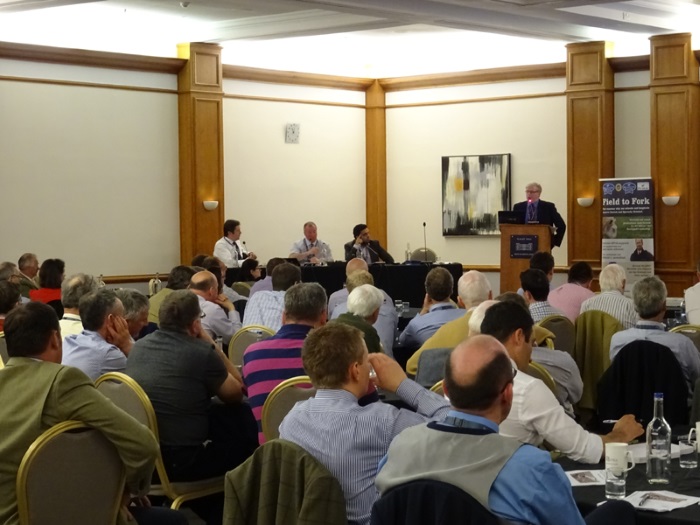A positive look at a post-Brexit red meat trade will be based on a focus of ‘provenance and credibility’, according to keynote speakers at the conference of the Livestock Auctioneers Association (LAA) and the Institute of Auctioneers and Appraisers in Scotland (IAAS) last weekend.
Addressing the challenges and opportunities that will follow the UK’s withdrawal from the EU, speakers including AHDB’s Phil Bicknell, Stuart Ashworth of Quality Meat Scotland (QMS) and Rizvan Khalid of Euro Quality Lambs (EQL) agreed that a focus on food quality safeguards and quality standards will be key to the continued success and trading position of the UK livestock industry.
In a conference that combined the General Assembly of the European Association of Livestock Markets (AEMB), UK and European delegates listened intently as speakers talked of the opportunities, rather than challenges, that Brexit presents.
Taking questions from the floor, Stuart Ashworth, head of economics services at QMS explained, “Price is not always the most important factor. What Brexit has given us is an opportunity to position our product as one of provenance and credibility, and we should be looking at branding to differentiate ourselves from the cheaper alternatives that will no doubt enter the market in a post-Brexit era.”
Echoing his comments, Mr Bicknell, AHDB’s market intelligence director commented, “We know we face some uncertainties in policy and trade, but we know that a big advantage is that we have a relatively affluent UK population of 65 million who care about their food and where it comes from.”
These comments suggest that the industry will not only retain a strong export market, but there is also significant untapped UK buying potential that the industry should also look to address.
One area that provides a huge opportunity for the UK livestock sector is the Halal market, as EQL’s senior director Rizvan Khalid explained.
“In 2015, the global Halal spend was $1.2 billion, and 16.6 percent of the total food expenditure. By 2021 this figure is expected to rise to $1.9 billion, representing a huge market potential for UK farmers,” he said.
“Combine this with the young demographic of the UK Halal market, 48 percent of Muslims in the UK are under 25, and 88 percent under the age of 50, you can see for yourself that this is a fast-moving segment.”
EQL is the largest Muslim-owned lamb slaughterhouse in Europe, and Mr Khalid went on to give an overview of the additional opportunities in export markets for both Halal lamb and beef.
Between speakers, attendees were also able to visit the adjacent trade stands of the conference sponsors, including Shearwell Data, experts in animal identification and management systems. Other sponsors included CRS, Linda Scott Associates, Nexus, Atradius, Newsline ASP, Thomas Hayton Winkley, NBA, Ice Cube, QMS, Scotbeef and Red Tractor Assurance.
Chris Dodds, LAA executive secretary said, “This conference once again demonstrates the high esteem in which the UK livestock industry is viewed internationally, and it is in our hands to seize the opportunity that the Brexit vote has presented to us.
“It was of great significance that we saw such a positive outlook from our auctioneers and industry partners, and the enthusiasm that was shown in embracing new opportunities will set the sector in good stead for the future.”
John Brereton, LAA chairman concluded, “The feedback we have received during and post-conference has been very encouraging. I would like to thank all of the delegates and speakers for their contributions, and we look forward to working closely together as we address future challenges and opportunities.”
The conference programme also included a visit to Hexham Livestock Market, and trips to a sheep and cattle farm in County Durham, and a dairy herd in Slaley near Hexham.


